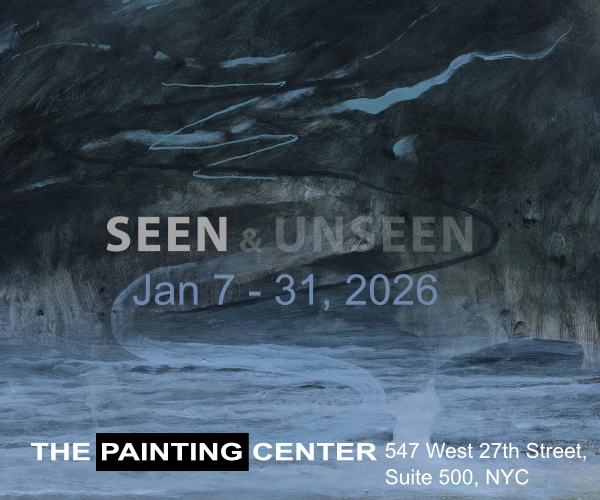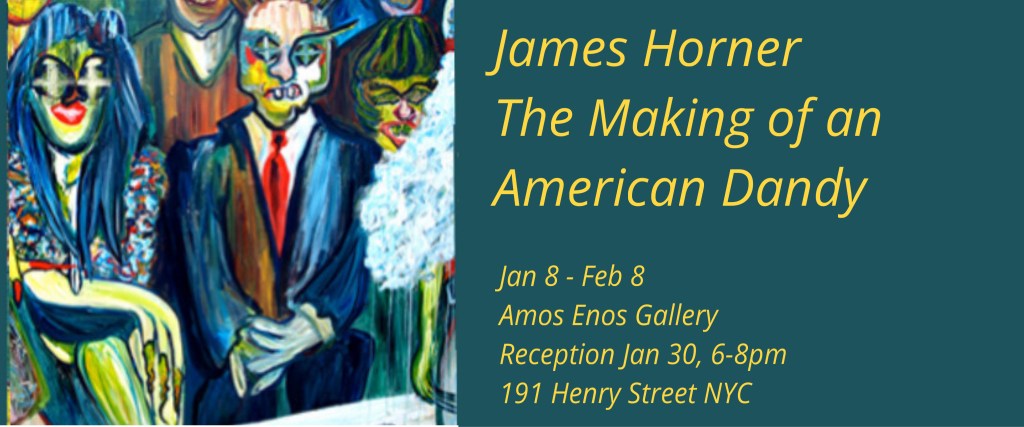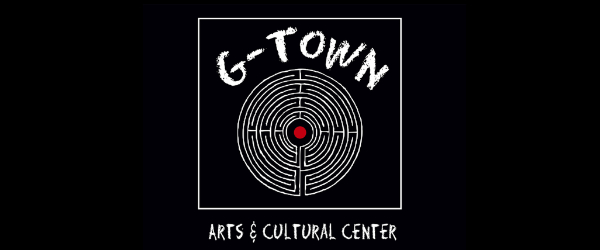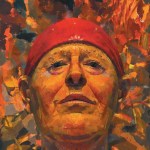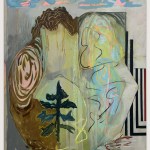
Contributed by Jonathan Stevenson / Albert Oehlen is perhaps foremost among visual artists seeking to capture the jangled frenzy of the Internet Age, having done so in virtuosic paintings that conveyed its sometimes frightening but often funny digital visitations into daily life and the everyday psyche. When his remarkable exhibition �Home and Garden� appeared at the New Museum in mid-2015, however, the darkest ramifications of the era had not yet arisen, and his show retained a jaunty, exploratory cast that was essentially neutral about the value of its portents. Then came the campaign and election of Donald Trump � the bastard spawn of manipulated social media and the ever-tightening cycle of the �fake news� that he himself, in Orwellian fashion, has simultaneously generated and condemned. Nicole Eisenman�s eloquently caustic mid-2016 New Museum show �All-ugh-ories� was more foreboding about civilization�s maladies. Endowed with the executive power of the presidency, Trump has contemptuously tried to undo much of the evolved integrity of U.S. and world governance, from civil rights enforcement to environmental regulation. Filmmaker Darren Aronofsky, in his gloriously polarizing chamber piece mother!, teases out the collective loss of civility on a more interpersonal level.
The first half of the film is like Edgar�Allan Poe iterating Quentin Tarantino, fusing a set of well-hewn horror movie tropes � the haunted house (Poltergeist, The Conjuring, etc.), unwanted and officious guests (Rosemary�s Baby), the blocked and narcissistic writer (The Shining), the servile wife (ditto) � into a pastiche of ethical and social chaos. A bourgeois-bohemian couple�s attempt to go off the grid in a big old house in the middle of nowhere is thwarted by the irrepressible onslaught of other people without boundaries and the writer�s pathological but seemingly unconscious obsession � he presents it as benevolence � with their attention on any terms as long as he is their focus.�There are planted allusions to �The Tell-Tale Heart� and �A Cask of Amontillado,� but this segment is relatively controlled and tentative, and overtly comic, like an extended Saturday Night Live skit. The message, so far, is fairly benign conventional wisdom: in today�s world nobody is alone and nobody can have anyone else to herself.
In the second half, the movie goes dystopic, anarchical, and singularly gruesome. The other�people whose attention the artist has solicited are no longer a community in any positive sense; rather, they are a pre-Hobbesean swarm composing and inhabiting a Bosch-esque hellscape.�By making mass communication a�compulsive end in itself,�Aronofsky suggests, social media and reality TV have put us in a�psychological state of nature, nasty and brutish and potentially short, in which shamelessness has replaced decency as the social coin of the realm. Once-exalted cultural touchstones like the birth of Christ are mocked, trivialized, and ultimately (in the movie�s most revolting and pointedly nihilistic�scene) transmogrified into rites of�degenerate adulation and misogynistic punishment. In this respect and the overarching suggestion of a deal with the Devil whereby the artist sacrifices his child and the love of his wife for the adoration of the crowd, mother!�is, as many have noted, resonant of�Rosemary�s Baby, but thematically it is both more expansive and more precisely trained on the zeitgeist.

The structural key to the film is Aronofsky�s strict enforcement of Lawrence�s titular mother�s point of view: the audience sees the world as she does. She alone apprehends the degradation of the customary constraints of privacy, decency, and respect; others, heedless of her pleas to respect her private property and personal space, are cluelessly malevolent perpetrators of their own moral demise and that of the collective welfare. Lawrence�s performance is perfectly calibrated, anchoring the movie with a portrait of pained, confounded vulnerability that never flags. She is, in effect, the straight woman. Javier Bardem supplies comic thrust with a sardonic, self-amused turn that works diabolically well. Ed Harris and Michelle Pfeiffer, as the proverbial Things That Wouldn�t Leave, are mordantly funny, as is Kristen Wiig playing the writer�s publisher. Aronofsky may go too far in a couple of ways, but he wisely brings the whole project back to earth with an O�Neill-like flourish at the end that leavens the movie�s content without draining it of truth or force.
mother! is�in essence a gonzo satirical allegory about the postmodern collapse of ethical and cultural norms precipitated by social media and mass addiction to public exposure. (That very description sounds as arch as�The Onion, but the world is what it is.) As such, this is a spot-on Trump-era film, and therefore a deeply pessimistic and appropriately subversive one. It is also perversely riveting, like a car accident or a retching dog, due to Aronofsky�s technical mastery as well as the story�s slaveringly over-the-top depiction of a living nightmare. More broadly, the film may point to � and influence � the more pronounced internalization and articulation of existential despair among artists beyond film. Oehlen�s next American show could well be palpably downbeat, and Eisenman�s next one even more caustic and sobering.
mother! 2017, written and directed by�Darren Aronofsky, starring Jennifer Lawrence and�Javier Bardem, with Ed Harris and Michelle Pfeiffer. Distributed by Paramount Pictures.
Related posts:
Albert Oehlen�s genius
Nicole Eisenman and the triumph of painting
The artworld on Facebook: A primer

